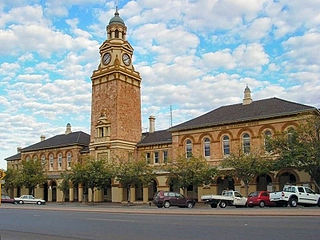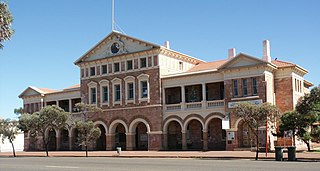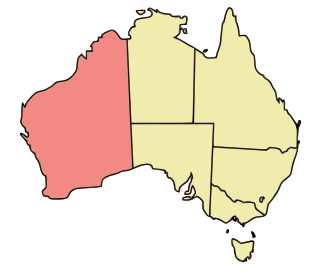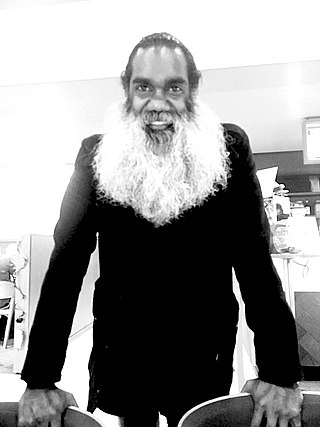Related Research Articles

Perth is the capital and largest city of Western Australia. It is the fourth most populous city in Australia and Oceania, with a population of over 2.3 million within Greater Perth. It is part of the South West Land Division of Western Australia, with the majority of Perth's metropolitan area on the Swan Coastal Plain between the Indian Ocean and the Darling Scarp. The city has expanded outward from the original British settlements on the Swan River, upon which its central business district and port of Fremantle are situated.

Western Australia is a state of Australia occupying the western third of the land area of Australia, excluding external territories. It is bounded by the Indian Ocean to the north and west, the Southern Ocean to the south, the Northern Territory to the north-east, and South Australia to the south-east. Western Australia is Australia's largest state, with a total land area of 2,527,013 square kilometres (975,685 sq mi). It is the second-largest country subdivision in the world, surpassed only by Russia's Sakha Republic. As of 2021, the state has 2.76 million inhabitants—11 percent of the national total. The vast majority live in the south-west corner; 79 percent of the population lives in the Perth area, leaving the remainder of the state sparsely populated.

Kalgoorlie is a city in the Goldfields–Esperance region of Western Australia, located 595 km (370 mi) east-northeast of Perth at the end of the Great Eastern Highway. It is sometimes referred to as Kalgoorlie–Boulder, as the surrounding urban area includes the historic townsite of Boulder and the local government area is the City of Kalgoorlie–Boulder.

Merredin is a town in Western Australia, located in the central Wheatbelt roughly midway between Perth and Kalgoorlie, on Route 94, Great Eastern Highway. It is located on the route of the Goldfields Water Supply Scheme, and as a result is also on the Golden Pipeline Heritage Trail.

Coolgardie is a small town in Western Australia, 558 kilometres (347 mi) east of the state capital, Perth. It has a population of approximately 850 people.

His Majesty's Theatre is an Edwardian Baroque theatre in Perth, Western Australia. Constructed from 1902 to 1904 during a period of great growth for the town, the theatre is located on the corner of Hay Street and King Street in Perth's central business district.

Perth Festival, named Perth International Arts Festival (PIAF) between 2000 and 2017, and sometimes referred to as the Festival of Perth, is Australia's longest-running cultural festival, held annually in Western Australia. The program features contemporary and classical music, dance, theatre, performance, literature and ideas, visual arts, large-scale public works. The main events of the festival take place every year, from February to March and the film program now known as Lotterywest Films runs from November to April, as part of the Perth Festival.

James MacCallum Smith was an Australian politician, newspaper proprietor and stock breeder. He lobbied unsuccessfully for many years for the secession of Western Australia from the Federation of Australia.

The Playhouse Theatre was a theatre in central Perth, Western Australia. It was purpose-built for live theatre in 1956 and remained one of the city's principal venues for performing arts for over half a century until replaced by the State Theatre Centre of Western Australia in January 2011. It was home to the National Theatre Company from its establishment until 1984, and then to its successor, the Western Australian Theatre Company, until its disbandment in 1990.

Theatre of Australia refers to the history of the live performing arts in Australia: performed, written or produced by Australians.

The Goldfields Water Supply Scheme is a pipeline and dam project that delivers potable water from Mundaring Weir in Perth to communities in Western Australia's Eastern Goldfields, particularly Coolgardie and Kalgoorlie. The project was commissioned in 1896 and completed in 1903.
The Eastern Goldfields is part of the Western Australian Goldfields in the Goldfields-Esperance region of Western Australia, covering the present and former gold-mining area east of Perth.

The network of railway lines in Western Australia associated with the timber and firewood industries is as old as the mainline railway system of the former Western Australian Government Railways system.

The Hole in the Wall Theatre was a small theatre in the Perth suburb of Leederville, Western Australia, operating from 1968 to 1984. In 1984 it was relocated to a civic auditorium in Subiaco which, as of 2020, is known as the Subiaco Arts Centre, a heritage-listed building, managed by the Perth Theatre Trust.

The Gold Stealing Detection Unit (GSDU), or Gold Stealing Detective Squad (GSDS), is a special unit of the Western Australian Police, based in Kalgoorlie, Western Australia. It investigates criminal activity and allegations at all stages of the gold production process in the state.

The Goldfields Titans was a semi professional rugby league club based in Kalgoorlie-Boulder, Western Australia, Australia. They compete in the Western Australia Rugby League's Harvey Norman Cup first grade competition and home games are played at the Goldfields Oasis Playing Fields.
Bardoc is an abandoned town in the Goldfields-Esperance region of Western Australia. It is situated between Kalgoorlie and Menzies along the Goldfields Highway.
The Kalgoorlie Brewing and Ice Company opened in 1896 in Kalgoorlie, Western Australia and traded successfully until 1943, when it was taken over by the Swan Brewery, and its name was simplified to Kalgoorlie Brewing Company. The Brewery, known locally as the 'Big K', located at Porter Street, Kalgoorlie, was the last survivor of nineteen breweries that once traded in the Eastern Goldfields.

Trevor Jamieson is an Aboriginal Australian stage and film actor, playwright, dancer, singer and didgeridoo player.
Mines Rovers Football Club is an Australian rules football team playing in the Goldfields Football League, a league based in the Goldfields region of Western Australia. Founded in 1898 as Mines Football Club, the club has enjoyed a long-standing involvement within in the league. One of the first clubs to play Australian football formed within the region, and helped popularise the sport, and supplant Rugby in popularity. The GFL was known as the Goldfields Football Association (GFA) from 1901 to 1907 and 1920–25, and as the Goldfields National Football League (GNFL) from 1926 to 1987. Mines Rovers play home games at Digger Daws Oval, one they are co tenants with other GFL member, Boulder City Football Club. Mines Rovers currently hold the record for most premierships in the GFL with 43.
References
- ↑ Perth Theatre Trust Annual Report 2016-2017 (PDF) (Report). Perth: Perth Theatre Trust. 2017. p. 11. Archived (PDF) from the original on 14 November 2017. Retrieved 14 November 2017.
- ↑ "Perth Theatre Trust Museum of Performing Arts". Perth Theatre Trust. Retrieved 5 March 2017.
- ↑ Patti Brook (23 November 2007). "Museum of Performing Arts". Australian Broadcasting Corporation . Retrieved 5 March 2017.
- ↑ "Museum of Performing Arts". City of Perth . Retrieved 5 March 2017.
- ↑ Perth Theatre Trust (W.A.) (1981), Perth Theatre Trust records , retrieved 4 March 2017
- ↑ "Western Australian Theatre Company Inc" (PDF). State Library of Western Australia.
- ↑ Milne, Geoffrey (2004). Theatre Australia (un)limited: Australian Theatre Since the 1950s. Australian playwrights. Rodopi. p. 174. ISBN 978-90-420-0930-1 . Retrieved 21 August 2023.
- ↑ Purves, N. Y (1962), The growth and development of the Perth Repertory Club and National Theatre , retrieved 4 March 2017
- ↑ Western Australian Theatre Company; National Theatre Company (W.A.); Perth Repertory Club (1900), Records, 1900-1990 , retrieved 4 March 2017
- ↑ Perth Theatre Trust (W.A.) (1990), News shot, The Trust, retrieved 4 March 2017
- ↑ Perth Theatre Trust (W.A.) (1980), His Majesty's Theatre, Perth Western Australia : command performance to celebrate the re-opening 28th May 1980, Perth Theatre Trust, retrieved 4 March 2017
- ↑ Perth Theatre Trust (W.A.) (1900), What's on BOCS this week?, Perth Theatre Trust, retrieved 4 March 2017
- ↑ Perth Theatre Trust (W.A.) (1900), Theatre in Perth, Dramatick Publishing, retrieved 4 March 2017
- ↑ "Fewer dark nights as Perth theatres aim to bring in the crowds". ABC News. 14 April 2014. Retrieved 6 March 2017.
- ↑ Perth Theatre Trust Annual Report 2018-2019 (PDF) (Report). Perth: Perth Theatre Trust. 2019. p. 13. Retrieved 9 January 2020.